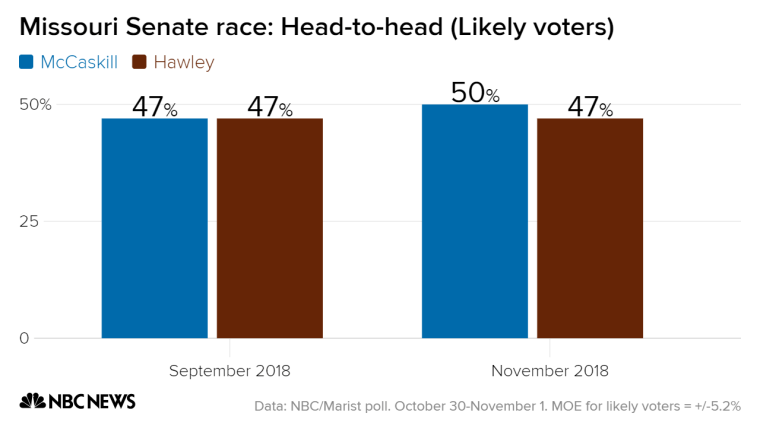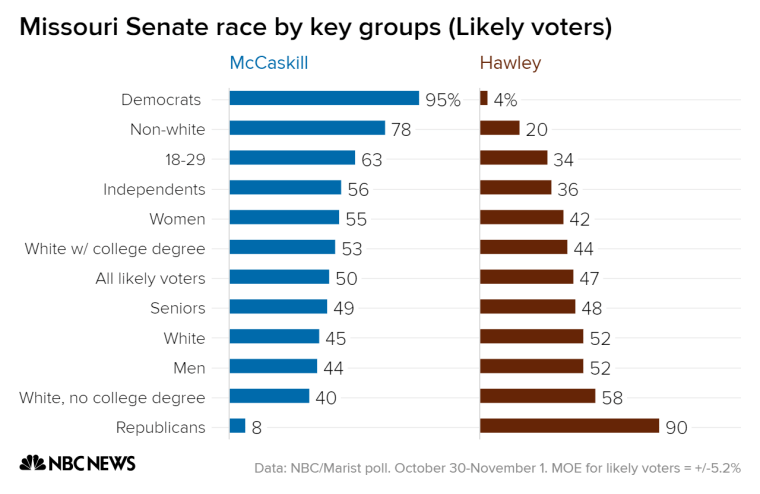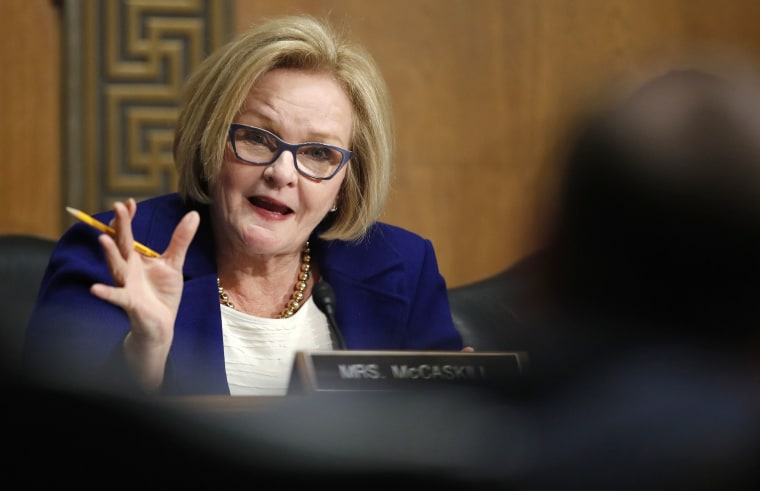Nearing the finish line of the 2018 election cycle, Democrat Claire McCaskill and Republican Josh Hawley are locked in a margin-of-error contest in Missouri’s important Senate race, according to a new NBC News/Marist poll of the state.
McCaskill, the state’s incumbent senator, gets support from 50 percent of likely voters in a head-to-head matchup, while Hawley, the state’s attorney general, gets 47 percent.
Just 3 percent of likely voters say they’re undecided.

In September’s NBC/Marist poll of the state, McCaskill and Hawley were tied at 47 percent each.
When the ballot expands to include the Libertarian and Green Party candidates, McCaskill’s lead remains at 3 points, 47 percent to 44 percent.
The results are all within the poll’s margin of error of plus-minus 5.2 percentage points. Other recent polls of Missouri show the race tied.
In the head-to-head matchup, McCaskill holds a 20-point advantage among likely independent voters (56 percent to 36 percent), as well as leads among women (55 percent to 42 percent), non-white voters (78 percent to 20 percent) and those under 45 (58 percent to 39 percent).

Hawley, meanwhile, is ahead among white voters (52 percent to 40 percent), men (52 percent to 44 percent) and those 45 and older (50 percent to 47 percent).
“Missouri is politically split down the middle,” says Lee Miringoff, director of the Marist College Institute for Public Opinion, which conducted this survey. “Republicans are hoping to emerge with their red state status intact while Democrats are hoping to score an upset. Independents are in the driver’s seat, and right now they’re leaning towards the Democrats.”
McCaskill, Hawley are more popular than they were in September
Forty-nine percent of likely voters in Missouri view McCaskill favorably, versus 45 percent who see her in an unfavorable light (+4).
That’s a turnaround from September, when it was 41 percent favorable/49 percent unfavorable (-8).
As for Hawley, 45 percent have a positive view of the Republican, compared with 42 percent who have a negative opinion (+3).
In September, Hawley’s favorable/unfavorable rating was right down the middle — 36 percent positive, 36 percent negative (even).
Trump’s job rating in Missouri: 51 percent
Also in the NBC/Marist poll, 51 percent of likely Missouri voters say they approve of President Donald Trump’s job performance, while 44 percent disapprove.
This is an improvement since September, when it was 45 percent approve, 46 percent disapprove.
By 3 points, likely voters in the state say they prefer a Republican-controlled Congress instead of a Democratic-controlled Congress, 48 percent to 45 percent.
And asked about Supreme Court Justice Brett Kavanaugh, 42 percent of likely voters say they’re more likely to vote for a candidate who supported Kavanaugh (like Hawley did), compared with 35 percent who say they’re more likely to vote for someone who opposed him (like McCaskill did).
How will the persuadable voters break?
Finally, the NBC/Marist poll identifies 11 percent of the likely voters on the multi-party ballot (including the Libertarian and Green parties) as being “persuadable” — that is, undecided or leaning toward a candidate but indicating they could change their minds.
Among this sliver of persuadable voters, just 40 percent approve of Trump’s job; McCaskill holds a 37 percent/32 percent favorable/unfavorable rating (+5); Hawley’s favorable/unfavorable is 28 percent/35 percent (-7); and congressional preference is Republican +3.
The live-caller NBC/Marist poll of Missouri was conducted October 30 through November 1 of 1,016 adults (which has a margin of error of plus-minus 3.9 percentage points), 920 registered voters (plus-minus 4.1 percentage points) and 600 likely voters (plus-minus 5.2 percentage points).


